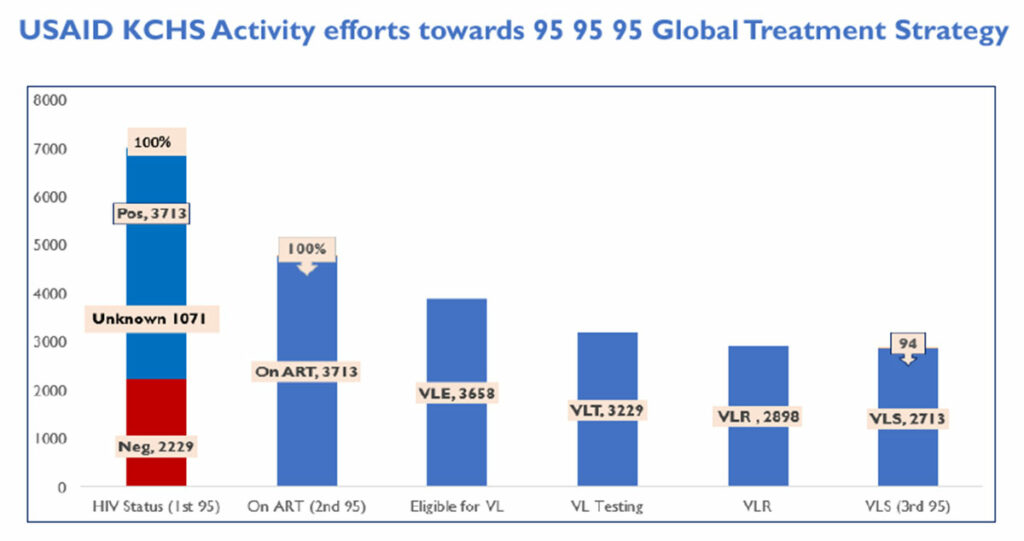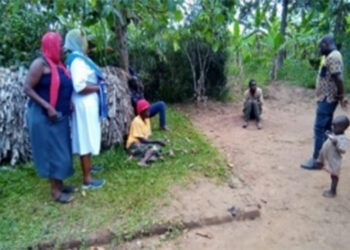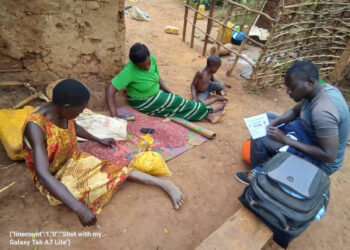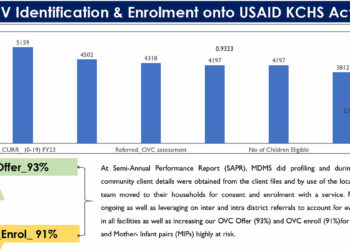

During the quarter, 20,984 (13,596F, 7,388M) beneficiaries were served with comprehensive services out of the targeted 21019 representing 100% OVC-SERV. Additionally, 1534 (973F, 561M) beneficiaries were newly enrolled onto the KCHS- Activity.
Out of the 20,984 comprehensive beneficiaries that were served; 13, 971 (67%) were children while 7013 (33%) were adults which represents a 67:33 child, caregiver ratio. MDMS will continue to collaborate and leverage on inter- district referrals as well as providing technical support to districts to continuing enrolling new priority population especially Children Living with HIV (CLHIV) and HIV Exposed Infants (HEI).
With the help of 289 PSWs, MDMS reached out to these beneficiaries at household level and offered wholistic services to enable them improve their household wellbeing in terms of health, safety, schooled, and stability.
Additionally, to reduce new infections and ensure continuity into care, PSWs offered HIV prevention messages to HIV negative beneficiaries and targeted index beneficiaries with adherence counselling, education on the benefits of disclosure, the need for a treatment buddy, offered hygiene and sanitation massages including emphasis to drinking clean water, nutrition education, screening for TB, and GBV and making bi-directional referrals for other wrap around services.

Articles from KCHS Activity
-
Joint Collaboration with Different Actors to Increase Viral Load suppression among Children
Given the various complex challenges faced by non-suppressors, some of which are gender-based, health-related, and social, the joint IAC with CDOs and health workers was formed to ensure that beneficiaries received a wide range of services during their visit.
May 22, 2024Read More -
Identifying Unique Challenges/barriers for Non suppressing among CLHIV
To strengthen collaboration in addressing the root causes to non- suppression, 40 facility case conference meetings with non- suppressors and their caregivers were conducted during the quarter across 6 districts.
May 22, 2024Read More -
USAID KCHS Activity Efforts towards HIV through Economic Strengthening at Household level
During the quarter, 115 SILC groups have been able to make cumulative savings of UGX 161,520,000 out of which UGX 74,667,000 has been accessed through loan. A total of 115 groups received financial literacy skills training and other adds on services to help them make better financial decisions,
May 22, 2024Read More -
Powers of Disclosure and Mental Health Screening Activities for HIV Epidermic Control
17 non-suppressing CLHIV patients aged 10 to 17 years who were disclosed were placed on post-disclosure monitoring. The findings of the post-disclosure monitoring revealed that adolescents are experiencing distress and stress. During the post-disclosure monitoring, “Namugerwa Shamim, a 12-year-old (0013 HH Code) (2141 VL copies) from Bukango S/C, Bukango Parish, Kawoko Village, opened up to
May 22, 2024Read More




